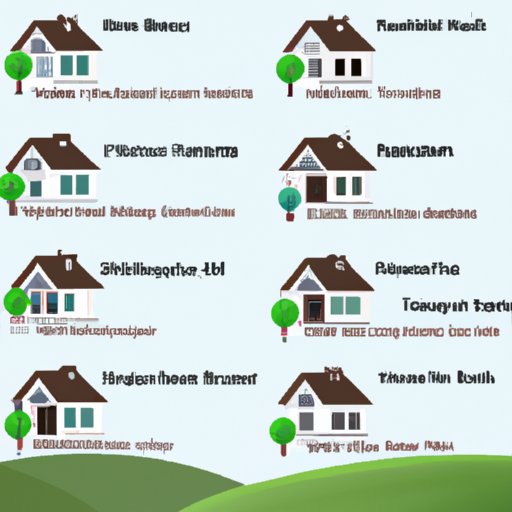Introduction
Real estate brokerages provide a vital service to homeowners and businesses alike. They are responsible for helping their clients buy, sell, or lease property, and they act as a liaison between buyers and sellers. Starting a real estate brokerage can be a rewarding and lucrative endeavor, but it also requires careful research, planning, and funding.
In this article, we will discuss the steps necessary for establishing a real estate brokerage, the financial requirements, the different types of brokerages, how to obtain the proper licensing and insurance, and the benefits of owning a real estate brokerage. We will also offer tips on recruiting agents and growing your business.
Definition of Real Estate Brokerage
According to Investopedia, a real estate brokerage is “a company that connects buyers and sellers of real estate properties. The broker typically charges a commission for each transaction.” A real estate broker is an individual who is licensed to perform real estate transactions, while a real estate brokerage is the business entity that employs those brokers.

Overview of Benefits of Starting a Real Estate Brokerage
Real estate brokerages offer a variety of benefits to both their owners and their clients. For the owner, there is the potential for high profits and professional growth. According to a study by the National Association of Realtors, the median gross income for real estate brokers was $59,630 in 2018. Additionally, many people find that owning their own business allows them to have more control over their work schedule and enjoy greater autonomy.
For clients, real estate brokerages provide access to knowledgeable professionals who can help guide them through the often-complicated process of buying, selling, or leasing property. Furthermore, the presence of a broker can help ensure that the client is getting the best deal possible.

Outline the Steps for Establishing a Real Estate Brokerage
Before you can begin operating your real estate brokerage, there are several steps you must take. These include:
1. Research State Requirements
Each state has its own laws regarding the operation of real estate brokerages. These laws may include requirements for licensing, insurance, and other aspects of running a business. It is important to familiarize yourself with the regulations in your state so you can ensure that you are in compliance.
2. Choose Your Business Structure
The type of business structure you choose for your real estate brokerage will affect how you file taxes and determine liability. Common structures include sole proprietorship, partnership, limited liability company (LLC), and corporation. Each option has its own pros and cons, so it is important to understand the differences before making a decision.
3. Obtain Licensing and Insurance
You will need to obtain a real estate license in order to operate your brokerage. This license is typically obtained through the state department of real estate. You may also need to purchase errors and omissions insurance, which protects you from any mistakes you or your agents may make when conducting business.
4. Set Up a Business Plan
Having a solid business plan is essential for any successful business venture. Your plan should include goals, strategies, and a budget. It should also outline the services you plan to offer and how you will market and promote your business.
5. Secure Funding
Lastly, you will need to secure funding for your real estate brokerage. This can come in the form of investments, loans, grants, or other sources. It is important to do your research and determine which option is best for you and your business.

Discuss the Financial Requirements for Starting a Real Estate Brokerage
Capital Requirements
When starting a real estate brokerage, it is important to consider the capital requirements. According to the Small Business Administration, the average cost of starting a real estate brokerage is between $10,000 and $50,000. This includes the cost of obtaining a license, setting up a business plan, and securing funding.
Expenses to Consider
In addition to the initial start-up costs, there are ongoing expenses associated with running a real estate brokerage. These include rent for office space, salaries for employees, marketing costs, and technology expenses. It is important to factor these costs into your budget when determining how much funding you need.

Highlight the Different Types of Real Estate Brokerages
Real estate brokerages can specialize in one type of property or multiple types. Some of the most common types of brokerages include:
Residential Brokerage
A residential brokerage specializes in the buying and selling of single-family homes, townhouses, and condominiums. Residential brokerages typically focus on helping individual buyers and sellers, rather than businesses.
Commercial Brokerage
A commercial brokerage specializes in helping businesses buy, sell, or lease properties such as offices, warehouses, and other commercial buildings. These brokerages typically require a deeper understanding of the commercial real estate market.
Multi-Family Brokerage
A multi-family brokerage specializes in the buying and selling of multi-family dwellings, such as apartment buildings and duplexes. These brokerages often focus on helping investors, as multi-family properties tend to be more lucrative investments.
Detail How to Obtain Licensing and Insurance
Real Estate License Requirements
In order to operate a real estate brokerage, you must first obtain a real estate license. The requirements vary by state, but generally involve taking a course and passing an exam. It is important to research the specific requirements in your state before beginning the process.
Errors and Omissions Insurance
Errors and omissions insurance (E&O) is a type of liability insurance that protects you from any mistakes you or your agents may make when conducting business. Depending on the size of your business, you may need to purchase a separate policy or add E&O coverage to an existing policy.
Explain the Benefits of Starting a Real Estate Brokerage
Financial Opportunities
One of the biggest benefits of owning a real estate brokerage is the potential for high profits. According to a study by the National Association of Realtors, the median gross income for real estate brokers was $59,630 in 2018. With careful planning and hard work, it is possible to make even more.
Professional Growth
Owning a real estate brokerage also offers the opportunity for professional growth. As the business grows, the owner can delegate tasks and hire additional agents, allowing them to focus more on strategic planning and business development. This can lead to increased income and job satisfaction.
Offer Tips on Recruiting Agents and Growing Your Business
Define Your Niche
When recruiting agents, it is important to define your niche. This will help you attract the right agents for your business and ensure that they have the skills and knowledge needed to serve your clients. For example, if you specialize in residential real estate, you may want to look for agents who have experience in this area.
Invest in Technology
Technology is playing an increasingly important role in the real estate industry. Investing in the right technology can help streamline operations and make it easier for agents to serve their clients. This could include investing in customer relationship management (CRM) software or adopting new digital marketing strategies.
Utilize Social Media
Social media can be a powerful tool for recruiting agents and growing your business. Platforms like Facebook, Twitter, and Instagram can be used to advertise open positions, share success stories, and engage with potential clients. It is important to use social media strategically to maximize its potential.
Conclusion
Starting a real estate brokerage requires careful planning and consideration. By researching state requirements, choosing the right business structure, obtaining licensing and insurance, setting up a business plan, and securing funding, you can create a successful and profitable business. Additionally, understanding the different types of brokerages and the financial requirements will help you make informed decisions.
Owning a real estate brokerage offers a variety of benefits, including financial opportunities and professional growth. It is important to recruit the right agents and invest in technology to ensure that your business is successful. Finally, utilizing social media can help you reach potential clients and grow your business.
(Note: Is this article not meeting your expectations? Do you have knowledge or insights to share? Unlock new opportunities and expand your reach by joining our authors team. Click Registration to join us and share your expertise with our readers.)
